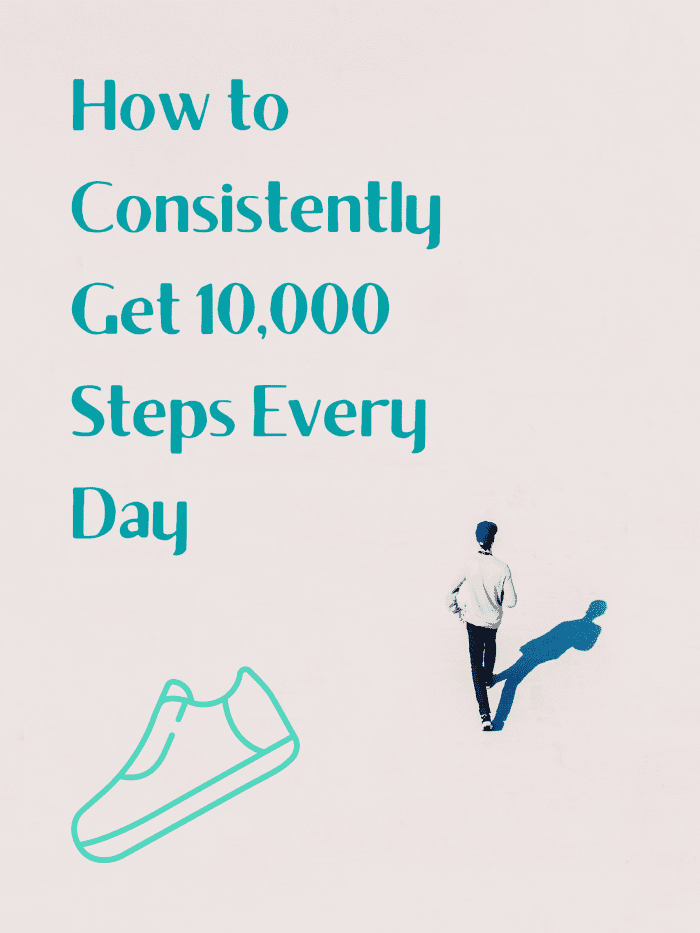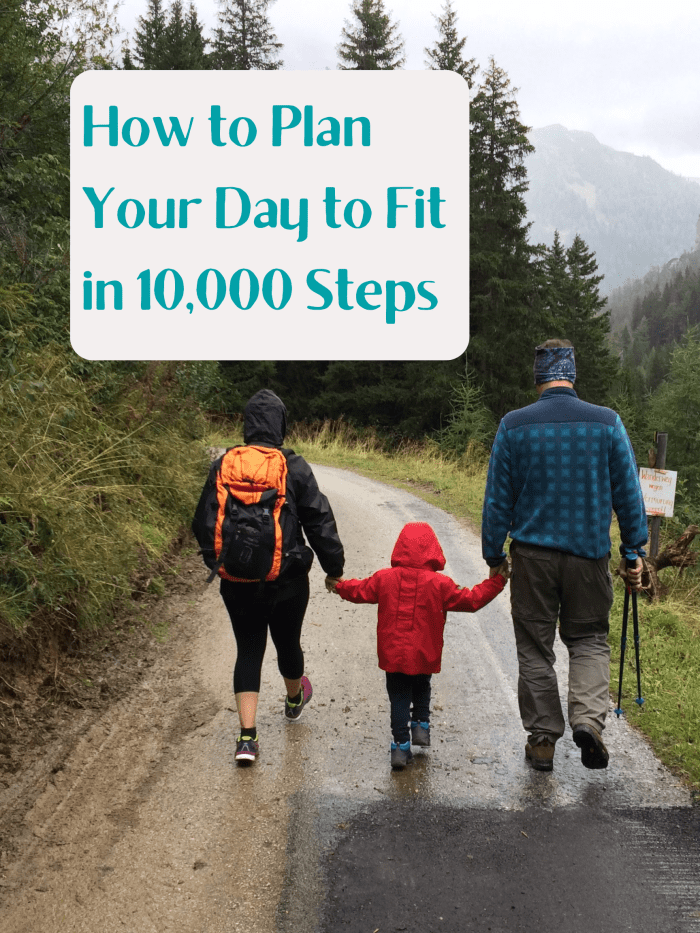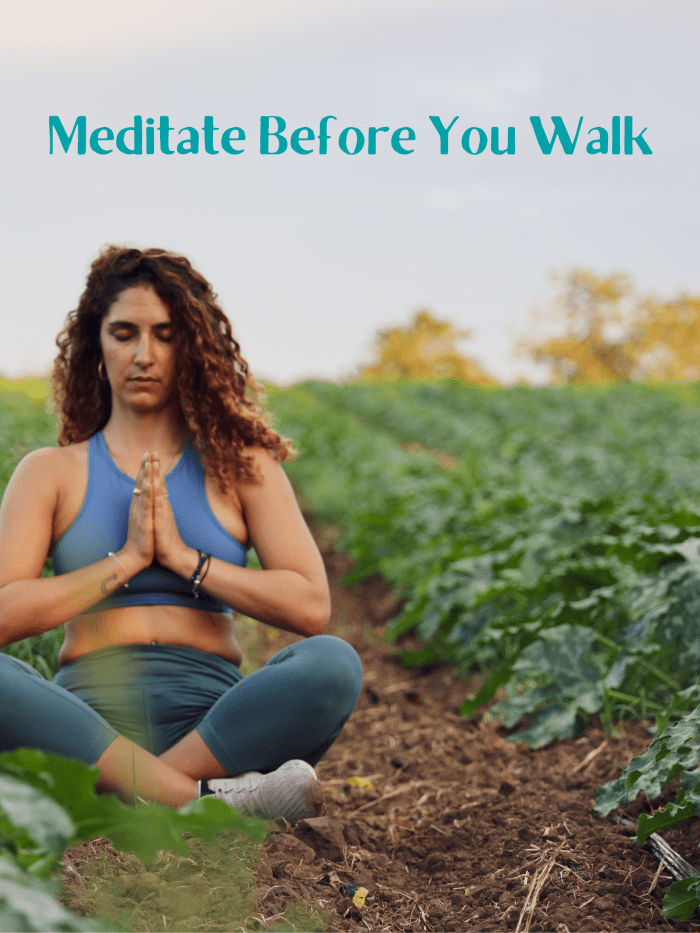
Walking 10,000 steps takes commitment and creativity. You need to plan how you’re going to get your steps into your day while also taking on your job, your kids, and all the other activities.
Jeffrey Czum, Pexels. Font created using Canva.
Committing to the Challenge
It’s not too challenging to get 10,000 steps in one day, but to do it every day for months straight is hard. It takes commitment and creativity to keep your pedometer’s numbers in the five digits.
I’ll help you achieve this dream with some tips and tricks. First, you should ask yourself a very important question: Why do I want to get 10,000 steps in a day?
Benefits of Walking
Below I’ve listed several benefits of walking daily:
- An extra 10,000 steps each day burns about 2,000 to 3,500 extra calories per week.
- Walking regularly helps prevent a long list of diseases.
- It’s good for your cardiovascular system.
- It is good for toning your whole body.
- Walking counteracts all the sitting you do in a day. The more you sit the more you engage in a sedentary lifestyle, which can pack on pounds and put stress on your body’s systems.
- Walking daily strengthens your lungs. As the rate and volume of oxygen you inhale go up, so does your body’s ability to use it effectively.
- It helps improve your concentration. Physical activity boosts feel-good hormones. You’ll feel less stressed and anxious. Letting go of stress will help you to feel more creative and productive.
- It strengthens your bones.
- It helps you process grief by giving you forward momentum.
- It helps stabilize your blood sugar.
- It can help lower your blood pressure.
- It helps keep your brain young. Those who walk regularly do better on cognitive tests.
- It helps your brain retain memories.
- It improves flexibility.
- It boosts your energy levels.
- It improves your mood.
- It helps you keep a healthy weight.
How Far Do You Travel When You Walk 10,000 Steps?
An average person has a stride length of about 2.1 to 2.5 feet. Two-thousand steps equal about one mile; therefore, 10,000 steps equal about five miles. On my Apple phone, 10,000 steps add up to 4.2 miles.
You do not necessarily have to get your steps from walking. If you run or do other cardio, you could get all those steps faster. I want to help you find extra steps through walking because it is the easiest and most convenient form of exercise.
For most days, it’s probably best to spread out your steps. We can’t all fit in a 10,000-step hike in one go.
How to Count Steps
I’ve listed some common tracking devices for steps. These are affordable or are already built-in to your devices.
- Fitbit trackers
- Phones have health settings that track your steps. If you walk around with your phone, it may track your steps for you.
- iGANK Simple Walking Pedometer
Fitness trackers often look at multiple items. They’ll track stairs climbed, distance traveled, distance when swimming, your heart rate, calories burnt, and calories taken in. Some also monitor your heart rate and sleep quality.

(1) Combine activities: walk while you work. (2) Walk in place behind your couch instead of sitting. (3) Make goals to visit parks. (4) Get a dog and take him on daily walks. (5) Get up and do some chores.
Alberto Casetta, Unsplash
30 Creative Ways to Get More Steps by Walking
In case you’re struggling to come up with ways to incorporate steps into your day, I’ve listed 30 ideas below. Sometimes you need to brainstorm to figure out how you’re going to add movement into your day.
- Do household chores: tidy up your home, vacuum, mop the kitchen floors, put away laundry, put away dishes, put away toys, etc.
- Get into gardening.
- Go apple or berry picking.
- Go on a nature hike to take pictures.
- Go to a conservation area for bird watching.
- Pace around the house while listening to music or a podcast.
- Instead of sitting on the couch and watching TV, stand behind the couch and walk in place.
- Park your car further away from entrances. You’ll add more steps if you walk through parking lots.
- Take the stairs. Skip the elevator.
- For your lunch break at work, go for a walk and eat along your journey.
- Take the long way to get to things. The shortest distance might be the most logical, but it doesn’t do the most for your body.
- Start your day with a morning walk with the sun rising.
- End your day with an evening walk with the sun setting.
- Go to parks that are new to you and explore them.
- Check out places in town that you’ve never explored: museums, zoos, giant IKEA stores, malls, farms, downtown shopping districts, etc. Go to places where exploring and interacting with the scenery will naturally help you increase your steps.
- Walk around your neighborhood with your dog.
- Take your dog on a hike.
- Get a puppy and play with him.
- Get a standing desk and move your legs from time to time. Standing desks are better for your health compared to sitting for eight hours to do work. Resist the urge to sit for large chunks of the day. It’s hard on your heart.
- Play with your kids outside.
- Get into outdoor activities: throw around a Frisbee with a friend, play some basketball, play tennis.
- Try to walk on thin beams like you did when you were a child. See how well you can walk a tight rope or skinny beam. Do you have good balance?
- Go on a scavenger hunt.
- Walk through a graveyard.
- Walk around an area while listening to an audiobook.
- Mow the lawn with a push mower.
- Take up a dance class in town.
- Go to the gym and hit up a stride on the treadmill, elliptical, or exercise bike.
- Set a goal of how many national parks you’ll visit in a year.
- While at home, take steps while you read and play with your phone.
Finding Time Every Day to Walk
The tricky part of getting in your daily steps is managing your busy schedule. It’s hard to get in 10,000 steps when you have a ton of work on your plate, or when you’re trying to help manage all your kids’ schedules. You have to think ahead about how you’re going to get in your steps. Sometimes you get lucky and you can easily combine activities with walking.
HealthyWage is an app where you can bet on losing weight or increasing your steps for real money. The challenges force you to be dedicated, so you won’t lose your initial bet. You’ll have to get up and keep moving even if you would prefer to be a couch potato.
Here are a couple of things to keep in mind:
- It can take time to work yourself up to 10,000 steps each day. You may want to slowly add in 1,000 more steps each week until you feel like you can successfully get to 10,000 or more.
- One of the easiest ways to get in your steps is to walk in place. You’re still working your muscles even if you’re just walking in place. We use 200 muscles to take a single step forward.
Hydration and Rest
Two things you should do to increase your odds of getting in those steps are: staying hydrated and going to bed at a decent time. Staying hydrated is important for any kind of exercise, and though you might not be sweating as much as you would with more extraneous exercise, walking can still drain you. (Your body will always thank you for nourishing it with H2O.)
Getting enough sleep will help you to stay motivated. You want to aim for eight hours of sleep each night, which will help your body to heal, repair its muscles, encourage strong immune health, and help you get what you need from dreams. If you’re not getting enough sleep, it will be hard to get enough steps. Lethargy doesn’t help when you want to add exercise into your life.
Here are some simple ways to improve your health:
- Drink water as you feel thirsty. You may want to drink more water if you start to feel headaches.
- Eat healthy, balanced meals. It can be hard to want to walk if you’re not eating right. Food often carries water in it.
- Sleep consistently, so you can be prepared to move the next day.
- Taking all the above steps will improve your circadian rhythm’s functions which will help you fight off anxiety.
It takes me about 10 minutes to get 1,000 steps just by walking. If you’re having a hard time coming up with a solution to a problem, take a break and walk for 10 minutes. You’ll shave off some steps, and you’ll give your mind a change of scenery — which is good when you’re too focused on a single problem.

If you’re feeling negative about walks, try doing meditation before them. Relax and don’t psyche yourself out about getting enough steps. You didn’t fail if you didn’t reach 10,000 steps.
Mor Shani, Unsplash
Finding a Positive Mindset
You may find it hard to get in the right mindset to do daily walks. It’s important to talk to yourself and give yourself positive affirmations. The progress you get from doing daily walks is slow, but most things that are worthwhile and have long-term impacts move slowly. For instance:
- It takes time to learn a new language. You don’t learn a new language overnight.
- It takes time to learn how to cook. You don’t learn every recipe in one go.
- It takes time to save money. You gain more money with each paycheck.
Before you walk, take five minutes and try to relax. Try to clear your mind of worries. Take 10 deep breaths, close your eyes, and roll your shoulders back a couple of times. When you give yourself time for self-care, you will then receive the benefits from it.
5 Minutes of Rest
If you need a quick relaxation break, here are things you can do to fill up that short timeframe:
- Get into a seated position with your legs crossed.
- Lay on your back. Open your palms. Don’t squeeze your fists.
- Lay on your back with your knees raised.
- Loosen your jaw. Gently massage the sides of your face.
- Lay on your side and curl into a ball.
- Wrap your arms around your chest to give yourself a hug.
In your five-minute meditation, repeat some mantras about how you support yourself. I have a list for you in case you need something to spark your imagination.
20 Mantras for Walking
You can create your own mantras for walking. The following list is intended to reassure you that you’re making good decisions for yourself.
- “I can support a healthy body and a healthy mind. Walking helps support me.”
- “I am a living creature and walking makes me feel alive.”
- “I support my heart, my lungs, and brain with each step.”
- “I trust my feet to take me in the right direction.”
- “It is okay if I don’t know what will be my next step.”
- “Movement supports life.”
- “Walking is my way of saying thank you to my body.”
- “My body is a gift.”
- “I take care of myself by walking.”
- “I find meaning through my steps.”
- “I gain strength with each step.”
- “I remember positive things when I walk.”
- “I love the insights I find on my walks.”
- “Walking and living are the same thing.”
- “Walking in fresh air supports me.”
- “Healing is set in motion with walking.”
- “I order my steps with purpose and grace.”
- “I am open to what I find on my journey.”
- “I am thankful for my walks.”
- “My soul can breathe when I walk.”
When you meditate and talk to yourself about walking, you’re starting a conversation that helps you to trust yourself. (These conversations help you to remember the benefits of walking and encourage you to receive those benefits.)
Stretching before your walk can make your body feel more prepared.
Bluewater Sweden, Unsplash
Stretching
Meditation isn’t the only way to help support your walks. Stretching will help improve the quality of your walk.
- Great walks start with stretches, then move into a walk phase, then add some weight lifting, and then back to stretching.
- Before you walk, stretch for five to ten minutes. Touch your toes, stand on one leg, stretch your arms above your head, do a plank, do a yoga move, etc.
- Stretching helps prepare and loosen up your muscles before the walk.
- Staying flexible helps keep your joints pliable and ready to go.
- Stretching helps take away tightness.
Flexibility is good for your whole body. It’s important to remember you’re not just a stiff body and bones. In fact, 45–75% of your body is made up of water. That means staying flexible helps your body to have a flow.
According to Medical News Today:
- 80–85% of your brain is water.
- 80–85% of your kidneys are water.
- 75–80% of your heart is water.
- 75–80% of your lungs are water.
Slight dehydration can cause fatigue, headaches, lack of mental clarity, stress, and sleep issues. You need to keep your body hydrated and you need to move like water. You’re not meant to sit around like a rock. Your body, your soul, and your brain crave movement. The universe craves movement, which is why it keeps expanding.
Walking isn’t something you have to perfect or turn into a competition. It’s something you can do to help balance your life.
Here are my essential tips for having a pleasant walk:
- Before you walk, drink some water. Take some water with you.
- Take a snack with you just in case.
- Stop to stretch and take in the scenery.
- Listen to your body and go with the flow.
This content is accurate and true to the best of the author’s knowledge and does not substitute for diagnosis, prognosis, treatment, prescription, and/or dietary advice from a licensed health professional. Drugs, supplements, and natural remedies may have dangerous side effects. If pregnant or nursing, consult with a qualified provider on an individual basis. Seek immediate help if you are experiencing a medical emergency.
© 2021 Andrea Lawrence
Comments
Carolyn Fields from South Dakota, USA on April 30, 2021:
Excellent article. It reminded me that I need to stretch first – even for “just” a walk.
Andrea Lawrence (author) on April 30, 2021:
I think it’s wise to gradually add more steps. Going from 0 to 10,000 or even 7,500 to 10,000 is a huge adjustment. I’m excited for you and your journey!
Lorelei Cohen from Canada on April 30, 2021:
I started at around 3500 steps per day, moved up to 5000 for about 3 months, and now am between 6500 and 7500 per day. Slowly increasing to the desired 10,000 steps. I love my Fitbit.


